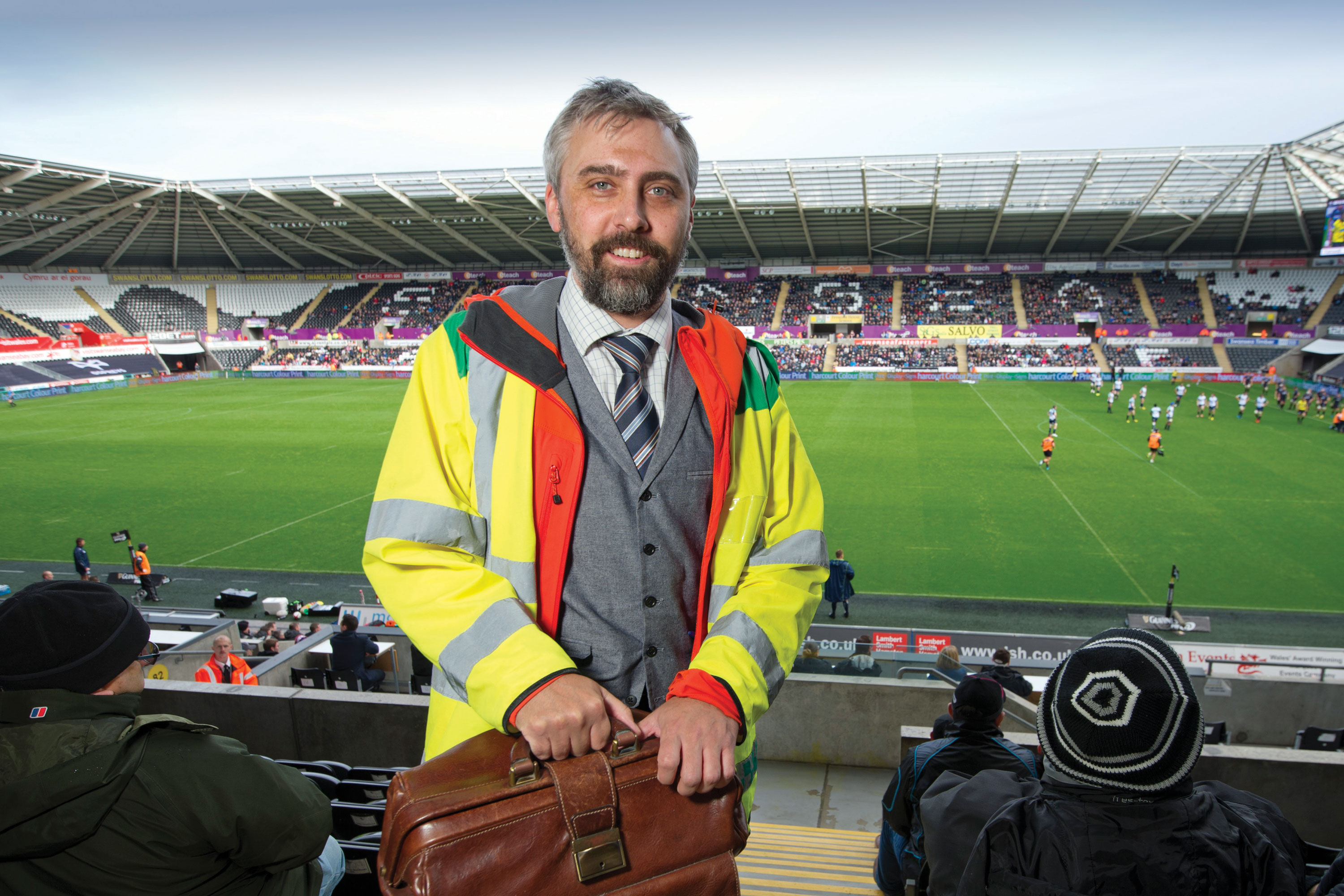A day as a crowd doctor


Profile: Dr Russell Clark
Age 39
Role Crowd doctor at the Liberty Stadium in Swansea, team doctor for Llandovery RFC and a GP in Swansea
Hours worked per week Five sessions in the GP practice; two sessions teaching clinical skills to Swansea University medical students; once or twice a month a crowd doctor at the Liberty Stadium and the same as a doctor for Llandovery RFC
11.25
It’s a Saturday and I arrive at the Liberty Stadium in Swansea for the rugby match between the local Ospreys and Connacht, from Ireland. I’ve had the job of crowd doctor, treating the crowd, staff and, on occasion, anyone passing the stadium for 10 years, having undertaken a diploma in sports and exercise medicine in 2004. Luckily I didn’t have to come from work today, but when kick-off is on a Friday night I have to race from the surgery after my last patient at 17.30.
11.30
It’s two hours before kick-off. I check my medical kit, ensure I have all the tools for any eventuality, check the drugs in my on-call bag, prepare the triage room, collect my walkie-talkie and sit down with a coffee. The medical team is made up of stewards, nurses, paramedics and members of St John Ambulance. I am the only GP.
12.45
We are already busy. A member of the crowd has forgotten their asthma inhaler. Two puffs is all they need to get them through the game.
13.30
Kick-off! The match gets started and we are on call in the main medical centre. The stewards send anyone to me who has been assessed at the scene by the medical teams in and around the stadium.
14.00
A young boy is brought in, crying profusely from a sting on the neck. A debate ensues about the nature of the stinging insect between the patient, the nurse, the paramedic, two cadets, the father and me. From the description of its shape, size and the battle that the boy fought against it, we conclude it was a wasp. This re-enactment and the application of paracetamol and ice distract him perfectly. He refuses Piriton as he wants to be fully alert for the game.
14.15
A child has trapped his fingers in the seats. It requires a simple check and application of a bandage, of course using the same distraction technique as for the wasp sting.
Thankfully, there’s nothing more dramatic. The most memorable incident I’ve ever had was a cardiac arrest when a gentleman collapsed in the stand and was effectively wedged under the seats. This is daunting at any time but there is extra pressure when the eyes of thousands of people are on you. The first-aiders commenced CPR, I worked with a paramedic to secure the airway and continued with his chest compressions while the scoop stretcher and trolley were manoeuvred into the awkward spot so that he could be carried to the ambulance.
I continued compressions while swinging around in the back of the ambulance and we raced to our local emergency department at Morriston Hospital. I later met the man at the St John Ambulance Christmas ball where he gave me an award (and a hug). He had gone back to his job as a salsa instructor.
14.45
It’s all quiet so I am able to watch the game from the north stand. This is still an important role: making up the numbers at a game with poor attendance. I sadly don’t get to watch when the stadium holds concerts. The crowd increases from an average of 8,000 to 30,000 to watch the likes of The Who, Elton John and the Kings of Leon, and the stadium medical staff increases to compensate. Triage rooms and first aid points buzz with activity as falls, scrapes, stings, bites, asthma attacks and faints come through for assessment.
15.30
The ‘all clear’ signal is given 30 minutes after the end of the game. We can relax.
15.45
I drive the seven miles home. When the rugby season is over and summer comes round we’ll be preparing for events between Swansea and Cardiff Universities. Our main task during these events is to treat alcohol intoxication and sunstroke. A pop-up hospital is created in the centre of Swansea to take on these challenges after the stadium has closed.
When I get home I check my medical kit is in order, complete my paperwork for any drugs administered and watch the highlights on TV if I missed the game.
Pulse October survey
Take our July 2025 survey to potentially win £1.000 worth of tokens













